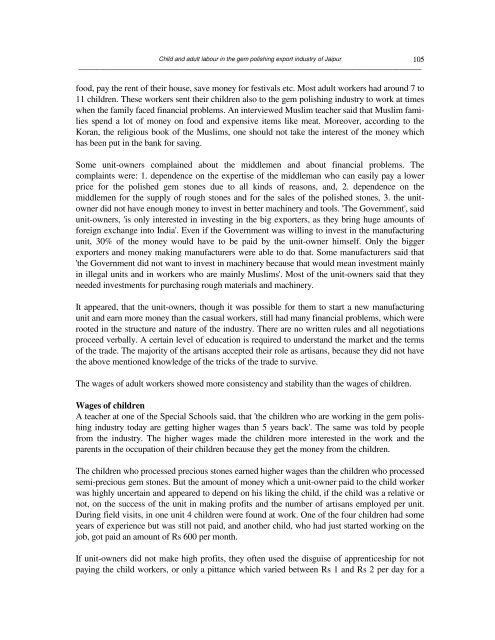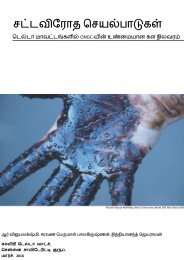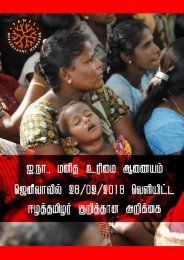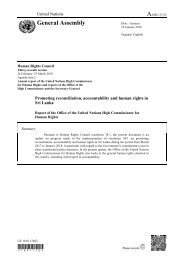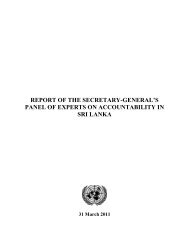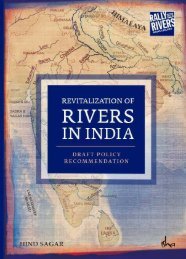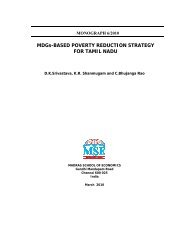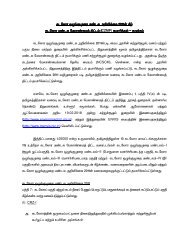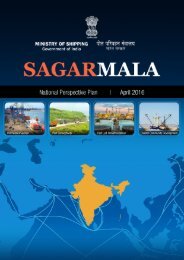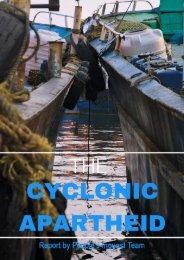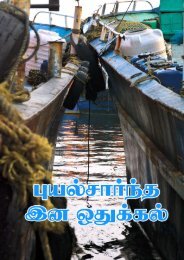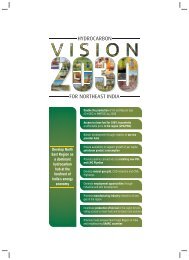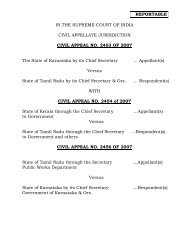Create successful ePaper yourself
Turn your PDF publications into a flip-book with our unique Google optimized e-Paper software.
<strong>Child</strong> <strong>and</strong> <strong>adult</strong> <strong>labour</strong> <strong>in</strong> <strong>the</strong> <strong>gem</strong> polish<strong>in</strong>g <strong>export</strong> <strong>in</strong>dustry <strong>of</strong> Jaipur<br />
──────────────────────────────────────────────────────────────────────────────────────────────<br />
food, pay <strong>the</strong> rent <strong>of</strong> <strong>the</strong>ir house, save money for festivals etc. Most <strong>adult</strong> workers had around 7 to<br />
11 children. These workers sent <strong>the</strong>ir children also to <strong>the</strong> <strong>gem</strong> polish<strong>in</strong>g <strong>in</strong>dustry to work at times<br />
when <strong>the</strong> family faced f<strong>in</strong>ancial problems. An <strong>in</strong>terviewed Muslim teacher said that Muslim families<br />
spend a lot <strong>of</strong> money on food <strong>and</strong> expensive items like meat. Moreover, accord<strong>in</strong>g to <strong>the</strong><br />
Koran, <strong>the</strong> religious book <strong>of</strong> <strong>the</strong> Muslims, one should not take <strong>the</strong> <strong>in</strong>terest <strong>of</strong> <strong>the</strong> money which<br />
has been put <strong>in</strong> <strong>the</strong> bank for sav<strong>in</strong>g.<br />
Some unit-owners compla<strong>in</strong>ed about <strong>the</strong> middlemen <strong>and</strong> about f<strong>in</strong>ancial problems. The<br />
compla<strong>in</strong>ts were: 1. dependence on <strong>the</strong> expertise <strong>of</strong> <strong>the</strong> middleman who can easily pay a lower<br />
price for <strong>the</strong> polished <strong>gem</strong> stones due to all k<strong>in</strong>ds <strong>of</strong> reasons, <strong>and</strong>, 2. dependence on <strong>the</strong><br />
middlemen for <strong>the</strong> supply <strong>of</strong> rough stones <strong>and</strong> for <strong>the</strong> sales <strong>of</strong> <strong>the</strong> polished stones, 3. <strong>the</strong> unitowner<br />
did not have enough money to <strong>in</strong>vest <strong>in</strong> better mach<strong>in</strong>ery <strong>and</strong> tools. 'The Government', said<br />
unit-owners, 'is only <strong>in</strong>terested <strong>in</strong> <strong>in</strong>vest<strong>in</strong>g <strong>in</strong> <strong>the</strong> big <strong>export</strong>ers, as <strong>the</strong>y br<strong>in</strong>g huge amounts <strong>of</strong><br />
foreign exchange <strong>in</strong>to <strong>India</strong>'. Even if <strong>the</strong> Government was will<strong>in</strong>g to <strong>in</strong>vest <strong>in</strong> <strong>the</strong> manufactur<strong>in</strong>g<br />
unit, 30% <strong>of</strong> <strong>the</strong> money would have to be paid by <strong>the</strong> unit-owner himself. Only <strong>the</strong> bigger<br />
<strong>export</strong>ers <strong>and</strong> money mak<strong>in</strong>g manufacturers were able to do that. Some manufacturers said that<br />
'<strong>the</strong> Government did not want to <strong>in</strong>vest <strong>in</strong> mach<strong>in</strong>ery because that would mean <strong>in</strong>vestment ma<strong>in</strong>ly<br />
<strong>in</strong> illegal units <strong>and</strong> <strong>in</strong> workers who are ma<strong>in</strong>ly Muslims'. Most <strong>of</strong> <strong>the</strong> unit-owners said that <strong>the</strong>y<br />
needed <strong>in</strong>vestments for purchas<strong>in</strong>g rough materials <strong>and</strong> mach<strong>in</strong>ery.<br />
It appeared, that <strong>the</strong> unit-owners, though it was possible for <strong>the</strong>m to start a new manufactur<strong>in</strong>g<br />
unit <strong>and</strong> earn more money than <strong>the</strong> casual workers, still had many f<strong>in</strong>ancial problems, which were<br />
rooted <strong>in</strong> <strong>the</strong> structure <strong>and</strong> nature <strong>of</strong> <strong>the</strong> <strong>in</strong>dustry. There are no written rules <strong>and</strong> all negotiations<br />
proceed verbally. A certa<strong>in</strong> level <strong>of</strong> education is required to underst<strong>and</strong> <strong>the</strong> market <strong>and</strong> <strong>the</strong> terms<br />
<strong>of</strong> <strong>the</strong> trade. The majority <strong>of</strong> <strong>the</strong> artisans accepted <strong>the</strong>ir role as artisans, because <strong>the</strong>y did not have<br />
<strong>the</strong> above mentioned knowledge <strong>of</strong> <strong>the</strong> tricks <strong>of</strong> <strong>the</strong> trade to survive.<br />
The wages <strong>of</strong> <strong>adult</strong> workers showed more consistency <strong>and</strong> stability than <strong>the</strong> wages <strong>of</strong> children.<br />
Wages <strong>of</strong> children<br />
A teacher at one <strong>of</strong> <strong>the</strong> Special Schools said, that '<strong>the</strong> children who are work<strong>in</strong>g <strong>in</strong> <strong>the</strong> <strong>gem</strong> polish<strong>in</strong>g<br />
<strong>in</strong>dustry today are gett<strong>in</strong>g higher wages than 5 years back'. The same was told by people<br />
from <strong>the</strong> <strong>in</strong>dustry. The higher wages made <strong>the</strong> children more <strong>in</strong>terested <strong>in</strong> <strong>the</strong> work <strong>and</strong> <strong>the</strong><br />
parents <strong>in</strong> <strong>the</strong> occupation <strong>of</strong> <strong>the</strong>ir children because <strong>the</strong>y get <strong>the</strong> money from <strong>the</strong> children.<br />
The children who processed precious stones earned higher wages than <strong>the</strong> children who processed<br />
semi-precious <strong>gem</strong> stones. But <strong>the</strong> amount <strong>of</strong> money which a unit-owner paid to <strong>the</strong> child worker<br />
was highly uncerta<strong>in</strong> <strong>and</strong> appeared to depend on his lik<strong>in</strong>g <strong>the</strong> child, if <strong>the</strong> child was a relative or<br />
not, on <strong>the</strong> success <strong>of</strong> <strong>the</strong> unit <strong>in</strong> mak<strong>in</strong>g pr<strong>of</strong>its <strong>and</strong> <strong>the</strong> number <strong>of</strong> artisans employed per unit.<br />
Dur<strong>in</strong>g field visits, <strong>in</strong> one unit 4 children were found at work. One <strong>of</strong> <strong>the</strong> four children had some<br />
years <strong>of</strong> experience but was still not paid, <strong>and</strong> ano<strong>the</strong>r child, who had just started work<strong>in</strong>g on <strong>the</strong><br />
job, got paid an amount <strong>of</strong> Rs 600 per month.<br />
If unit-owners did not make high pr<strong>of</strong>its, <strong>the</strong>y <strong>of</strong>ten used <strong>the</strong> disguise <strong>of</strong> apprenticeship for not<br />
pay<strong>in</strong>g <strong>the</strong> child workers, or only a pittance which varied between Rs 1 <strong>and</strong> Rs 2 per day for a<br />
105


